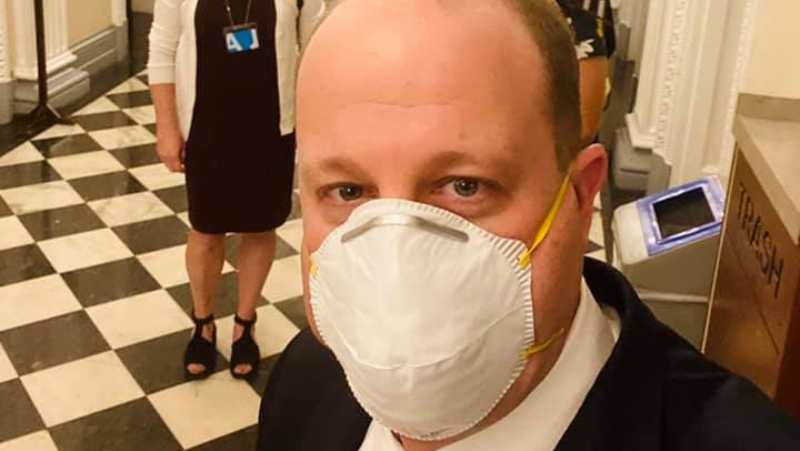Governor Jared Polis delivered some tough news for owners, employees and patrons of bars and clubs during his May 26 press conference regarding the state's efforts to fight COVID-19. Venues that aren't able to adapt their business model away from an environment that encourages different gatherings of people to freely blend together could well remain off limits for another month or more, he warned.
"If it's a social environment where a group of four or six can come in and sit together and enjoy a drink or dinner or whatever, that falls under the restaurant guidelines," Polis said. But if "it's a social free-for-all with hundreds of people," such enterprises "could be closed through June and perhaps July."
At the outset of his remarks, Polis praised Coloradans who "did a great job staying at home and staying safe" over the just-concluded Memorial Day weekend, "perhaps assisted by the rainy weather on Sunday and Monday." He also offered praise for the staff at Fitzsimons Army Medical Center in Denver for their work under challenging conditions to take care of Colorado's heroes. Included, too, were words of comfort, followed by a moment of silence in response to the recent death of another veteran, bringing to fifteen the number of vets who've lost their lives at Fitzsimons after contracting the novel coronavirus.
According to Polis, there have been approximately 24,500 COVID-19 cases in Colorado to date, and 1,088 deaths in which the virus was listed as the cause. However, he stressed that trends are moving in a positive direction; cases have declined in eleven of the past fourteen days, and hospitalizations were down on twelve days over the previous two weeks.
Polis attributed this success to Coloradans making the right moves in the month since the April 26 stay-at-home order was replaced by the safer-at-home program. The latter will transition to a new phase on May 29, "and so far, so good," he noted. "It's still dangerous. The virus is still there, and 200 or 300 people are contracting it every day in our state. There are losses ahead and losses behind us. The risk is lower, but still higher than during normal times."
Still, Polis celebrated an infection rate that's dipped significantly — the pace of transmission is now essentially one to one as opposed to three or four to one — and testing capacity that can handle 8,500 examinations per day, a goal set by the state for month's end that's been met early. He also cheered a new, seventeen-month contract with Honeywell to obtain six million medical-grade N95 masks, which were almost impossible to obtain back in March.
Nonetheless, the governor stressed that the dangers associated with large throngs mean that concerts and sporting events won't be able to take place as usual. "I would love to go to a Rockies game or a concert at Red Rocks," he acknowledged. "But 10,000 people packed into a crowded amphitheater or stadium would set the whole state back. It could lead to dozens and dozens of additional infections at a very large get-together like that."
Ski areas "are not open for that activity," he noted, referencing the just-granted permission he gave resorts to reopen. (Arapahoe Basin will do so tomorrow, May 27.) "This is skiing for the sake of skiing. The skiing piece is easy to do social distancing," he said. "But if you're in it for the party and keggers and hanging out and dancing, now is not the time."
As of June 1, summer camps can begin offering services, as well. Indoors, they'll be limited to groups of ten or fewer attendees, but outside, that number can expand to 25.
And tomorrow, May 27, restaurants can reopen across Colorado — under guidelines that include no more than 50 percent capacity. In recounting the employees who've suffered while they've been closed the past two months, Polis pointed out that "restaurants employ about 300,000 Coloradans — about 10 percent of the state workforce," in addition to serving an important social function. That's why he sanctioned their reopening as soon as the data allowed rather than waiting for another month or more, as Polis said some of his advisers suggested.
Here's a video created by the governor's office about the basic rules.
Also coming back is the Colorado Legislature, and Polis expressed an eagerness to work with Republicans and Democrats alike to build a resilient plan to help Colorado move forward. He drew particular attention to the need for laws that will protect and enhance individuals' health-care access, provide sick leave for hourly workers so that they won't have an incentive to show up at their job when they're ill, and revise the Gallagher Amendment, whose formula "doesn't work," he allowed.
During a subsequent question-and-answer session with reporters, Polis argued that restaurateurs who fear they won't be able to remain in operation if they have to stay within 50 percent capacity can increase the number of customers they serve by moving some operations outside, and he encouraged as many as possible to take advantage of this option.
On the subject of casinos, he conceded that a statewide rule about their reopening is unlikely, given that such enterprises can be found in just a few municipalities. Instead, counties are encouraged to work with the Colorado Department of Public Health and Environment to come up with workable procedures, as Teller County is currently doing and Gilpin County is apt to start soon.
CDPHE models suggesting future spikes were also mentioned, but Polis declined to predict what result their forecasts might have on policies during late summer and fall. "We're completely honest about where things are," he insisted. "And I can tell you that we don't know what August and September will look like. We're not going to lock ourselves into something based on predictions. We use our predictions to guide our current actions, and base future actions on data.... The data has gotten more and more refined, and we'll have better modeling in August for what September and October will look like."
Along those lines, he promised that on June 1, he'll provide a preview for what to expect during that particular month — but bars and clubs aren't likely to be part of the combo platter. "I've been to breweries, and the normal environment is more like a social free-for-all.... You hang out, see other friends across the room. It's not normally an environment where you sit down with four people and don't interact with others."
If bars, clubs and the like tweak things in ways that discourage mixing and mingling, they might be able to open soon, Polis promised. But if they don't, their doors could remain closed for weeks longer.
[
{
"name": "Air - MediumRectangle - Inline Content - Mobile Display Size",
"component": "12017618",
"insertPoint": "2",
"requiredCountToDisplay": "2",
"watchElement": ".fdn-content-body",
"astAdList": [
{
"adType": "rectangle",
"displayTargets": "mobile"
}
]
},{
"name": "Editor Picks",
"component": "17242653",
"insertPoint": "4",
"requiredCountToDisplay": "1",
"watchElement": ".fdn-content-body",
"astAdList": [
{
"adType": "rectangle",
"displayTargets": "desktop|tablet"
},{
"adType": "rectangle",
"displayTargets": "desktop|tablet|mobile"
}
]
},{
"name": "Inline Links",
"component": "18838239",
"insertPoint": "8th",
"startingPoint": 8,
"requiredCountToDisplay": "7",
"maxInsertions": 25
},{
"name": "Air - MediumRectangle - Combo - Inline Content",
"component": "17261320",
"insertPoint": "8th",
"startingPoint": 8,
"requiredCountToDisplay": "7",
"maxInsertions": 25,
"watchElement": ".fdn-content-body",
"astAdList": [
{
"adType": "rectangle",
"displayTargets": "desktop|tablet"
},{
"adType": "rectangle",
"displayTargets": "desktop|tablet|mobile"
}
]
},{
"name": "Inline Links",
"component": "18838239",
"insertPoint": "8th",
"startingPoint": 12,
"requiredCountToDisplay": "11",
"maxInsertions": 25
},{
"name": "Air - Leaderboard Tower - Combo - Inline Content",
"component": "17261321",
"insertPoint": "8th",
"startingPoint": 12,
"requiredCountToDisplay": "11",
"maxInsertions": 25,
"watchElement": ".fdn-content-body",
"astAdList": [
{
"adType": "leaderboardInlineContent",
"displayTargets": "desktop|tablet"
},{
"adType": "tower",
"displayTargets": "mobile"
}
]
}
]












